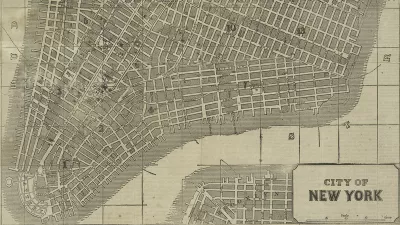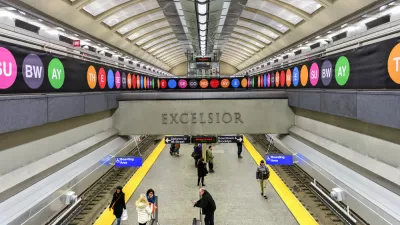A study by the Transportation Research Board calculates "land use effect" and "ridership effect" to show how much land is saved when cities include public transit.

Angie Schmitt shares news of a "study published by the Transportation Research Board quantifies the spatial impact of transit in new ways [PDF]. Without transit, the researchers found, American cities would take up 37 percent more space."
The crux of the study's findings, as described by Schmitt: "By allowing urban areas to be built more compactly, the 'land use effect' of transit reduces driving much more than the substitution of car trips with transit trips. Total miles driven in American cities would be 8 percent higher without the land use effect of transit, the researchers concluded, compared to 2 percent higher if you forced everyone who rides transit to drive." The study also found evidence of a "ridership effect," or the substitution of transit trips for car trips, but the "land use effect" is four times as large.
Schmitt also notes that the study includes a Land Use Benefit Calculator [xls], which is intended to be used just as its name describes.
FULL STORY: Without Transit, American Cities Would Take Up 37 Percent More Space

Planetizen Federal Action Tracker
A weekly monitor of how Trump’s orders and actions are impacting planners and planning in America.

Restaurant Patios Were a Pandemic Win — Why Were They so Hard to Keep?
Social distancing requirements and changes in travel patterns prompted cities to pilot new uses for street and sidewalk space. Then it got complicated.

Map: Where Senate Republicans Want to Sell Your Public Lands
For public land advocates, the Senate Republicans’ proposal to sell millions of acres of public land in the West is “the biggest fight of their careers.”

Maui's Vacation Rental Debate Turns Ugly
Verbal attacks, misinformation campaigns and fistfights plague a high-stakes debate to convert thousands of vacation rentals into long-term housing.

San Francisco Suspends Traffic Calming Amidst Record Deaths
Citing “a challenging fiscal landscape,” the city will cease the program on the heels of 42 traffic deaths, including 24 pedestrians.

California Homeless Arrests, Citations Spike After Ruling
An investigation reveals that anti-homeless actions increased up to 500% after Grants Pass v. Johnson — even in cities claiming no policy change.
Urban Design for Planners 1: Software Tools
This six-course series explores essential urban design concepts using open source software and equips planners with the tools they need to participate fully in the urban design process.
Planning for Universal Design
Learn the tools for implementing Universal Design in planning regulations.
Heyer Gruel & Associates PA
JM Goldson LLC
Custer County Colorado
City of Camden Redevelopment Agency
City of Astoria
Transportation Research & Education Center (TREC) at Portland State University
Camden Redevelopment Agency
City of Claremont
Municipality of Princeton (NJ)





























